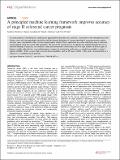Files in this item
A principled machine learning framework improves accuracy of stage II colorectal cancer prognosis
Item metadata
| dc.contributor.author | Dimitriou, Neofytos | |
| dc.contributor.author | Arandelovic, Ognjen | |
| dc.contributor.author | Harrison, David James | |
| dc.contributor.author | Caie, Peter David | |
| dc.date.accessioned | 2018-10-09T11:30:06Z | |
| dc.date.available | 2018-10-09T11:30:06Z | |
| dc.date.issued | 2018-10-02 | |
| dc.identifier | 255731693 | |
| dc.identifier | b9222836-116f-459a-86f8-879dba6a752a | |
| dc.identifier | 000449683300003 | |
| dc.identifier | 85108534486 | |
| dc.identifier.citation | Dimitriou , N , Arandelovic , O , Harrison , D J & Caie , P D 2018 , ' A principled machine learning framework improves accuracy of stage II colorectal cancer prognosis ' , npj Digital Medicine , vol. 1 , 52 . https://doi.org/10.1038/s41746-018-0057-x | en |
| dc.identifier.issn | 2398-6352 | |
| dc.identifier.other | ORCID: /0000-0002-0031-9850/work/60196547 | |
| dc.identifier.other | ORCID: /0000-0001-9041-9988/work/64034186 | |
| dc.identifier.uri | https://hdl.handle.net/10023/16174 | |
| dc.description.abstract | Accurate prognosis is fundamental in planning an appropriate therapy for cancer patients. Consequent to the heterogeneity of the disease, intra- and inter-pathologist variability, and the inherent limitations of current pathological reporting systems, patient outcome varies considerably within similarly staged patient cohorts. This is particularly true when classifying stage IIcolorectal cancer patients using the current TNM guidelines. The aim of the present work is to address this problem through the use of machine learning. In particular, we introduce a novel, data driven framework which makes use of a large number of diverse types of features, readily collected from immunofluorescence imagery. Its outstanding performance in predictingmortality in stage II patients (AUROC= 0:94), exceeds that of current clinical guidelines such as pT stage (AUROC= 0:65), and is demonstrated on a cohort of 173 colorectal cancer patients. | |
| dc.format.extent | 9 | |
| dc.format.extent | 1618471 | |
| dc.language.iso | eng | |
| dc.relation.ispartof | npj Digital Medicine | en |
| dc.subject | QA75 Electronic computers. Computer science | en |
| dc.subject | RC0254 Neoplasms. Tumors. Oncology (including Cancer) | en |
| dc.subject | NDAS | en |
| dc.subject | SDG 3 - Good Health and Well-being | en |
| dc.subject.lcc | QA75 | en |
| dc.subject.lcc | RC0254 | en |
| dc.title | A principled machine learning framework improves accuracy of stage II colorectal cancer prognosis | en |
| dc.type | Journal article | en |
| dc.contributor.institution | University of St Andrews. School of Medicine | en |
| dc.contributor.institution | University of St Andrews. Cellular Medicine Division | en |
| dc.contributor.institution | University of St Andrews. School of Computer Science | en |
| dc.identifier.doi | 10.1038/s41746-018-0057-x | |
| dc.description.status | Peer reviewed | en |
This item appears in the following Collection(s)
Items in the St Andrews Research Repository are protected by copyright, with all rights reserved, unless otherwise indicated.

